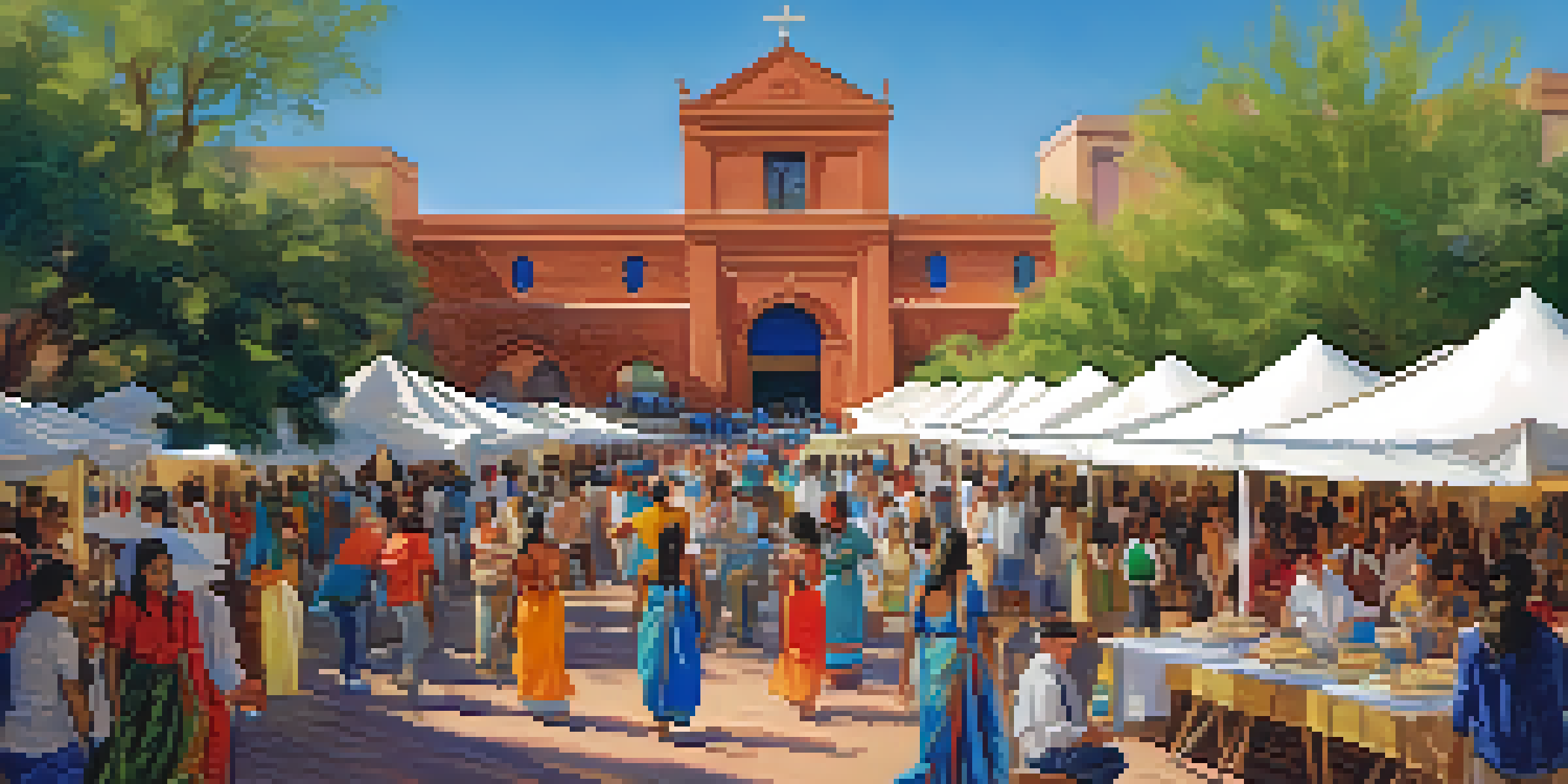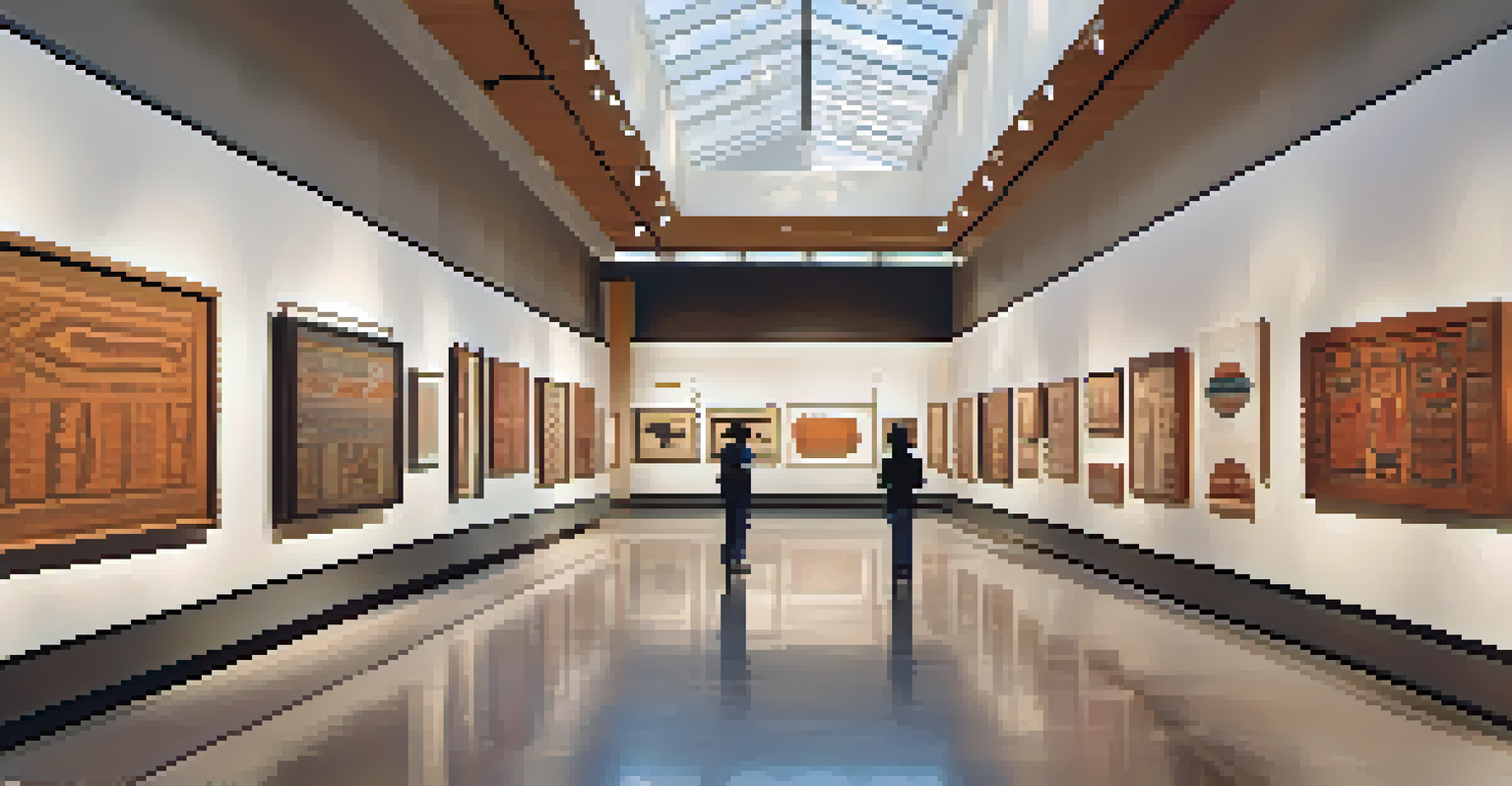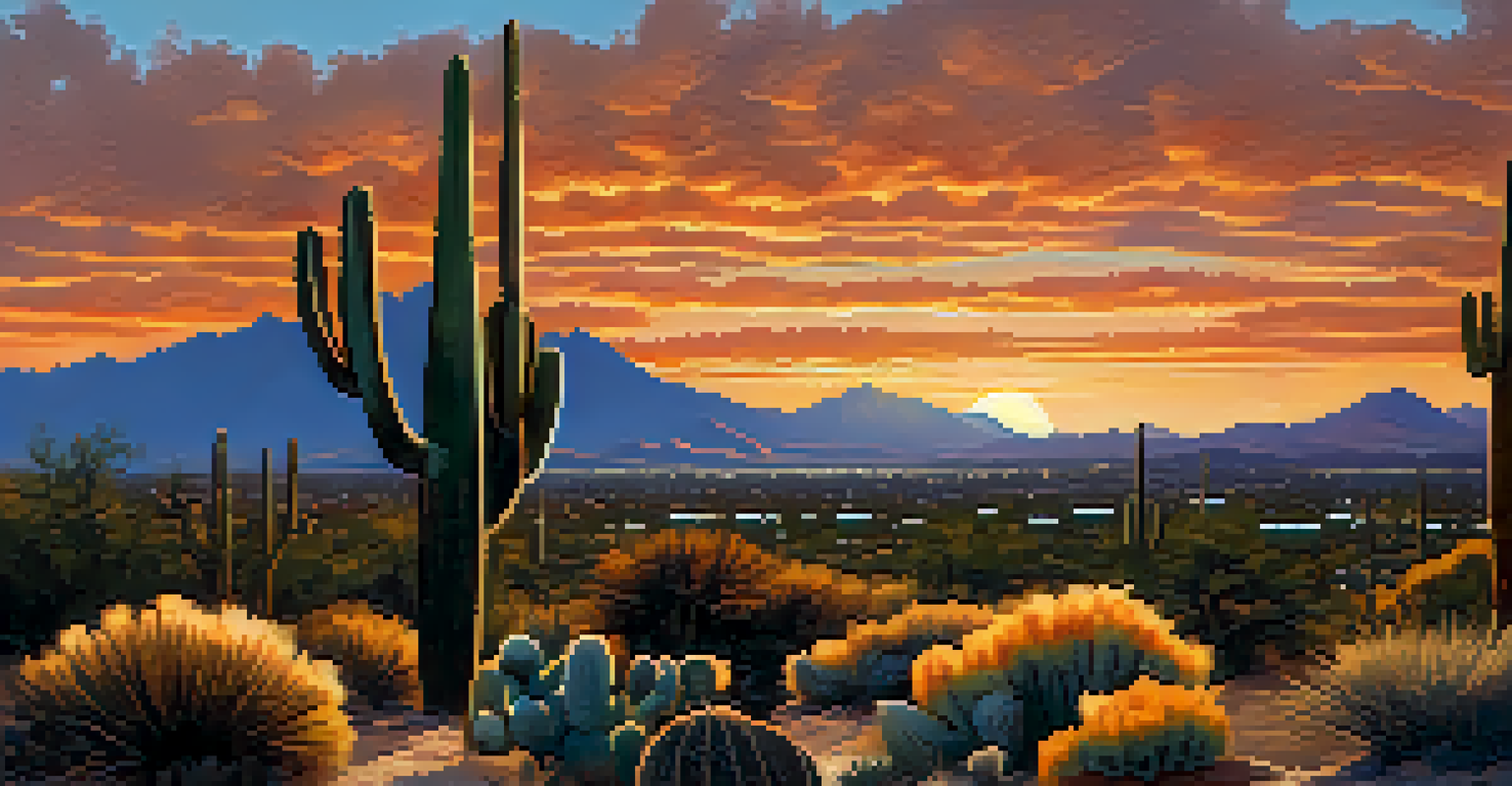Cultural Contributions of the University of Arizona to Tucson

The University of Arizona: A Cultural Hub in Tucson
The University of Arizona (UA) has been a cornerstone of Tucson's cultural landscape since its establishment in 1885. As one of the leading research institutions in the country, UA not only contributes academically but also serves as a vibrant cultural hub. From art exhibits to music performances, the university regularly hosts events that engage the community and celebrate the rich cultural tapestry of Tucson.
Art is the most beautiful of all lies; it is a lie that tells the truth.
The campus itself is a treasure trove of cultural resources, featuring museums like the Arizona State Museum and the Center for Creative Photography. These institutions not only showcase local and indigenous art but also provide educational programs that invite public participation. This accessibility fosters a deeper appreciation of the region's diverse heritage and encourages collaborative initiatives between the university and the community.
Moreover, the UA's commitment to cultural development is evident in its various outreach programs. These initiatives often focus on promoting the arts, heritage, and history of the area, making them essential to Tucson’s identity. By bridging the gap between academia and the public, the university enhances cultural understanding and builds lasting connections.
Art and Music: Enriching Tucson's Creative Scene
One of the most vivid ways the University of Arizona impacts Tucson's culture is through its vibrant art and music programs. The School of Art offers numerous exhibitions and showcases local artists, providing a platform for their work to reach a wider audience. This not only supports emerging artists but also enriches the cultural offerings available to Tucson residents and visitors alike.

In addition to visual arts, UA's School of Music hosts concerts, recitals, and opera productions that draw in talent from both the university and the broader community. These performances create a lively atmosphere that celebrates a range of musical genres, from classical to contemporary. This diversity allows for a rich cultural exchange, further solidifying Tucson's reputation as an artistic haven.
Cultural Hub of Tucson
The University of Arizona serves as a vibrant cultural hub, hosting events and programs that celebrate the region's diverse heritage.
Furthermore, the university's involvement in community arts initiatives, such as workshops and festivals, encourages collaboration between students and local artists. This symbiotic relationship not only nurtures creativity but also helps to strengthen community bonds through shared artistic experiences. The result? A flourishing cultural scene that resonates throughout Tucson.
Cultural Festivals: Celebrating Tucson's Heritage
The University of Arizona plays a significant role in hosting and sponsoring cultural festivals that celebrate Tucson's unique heritage. Events such as the Tucson Folk Festival and the Tucson International Mariachi Conference not only highlight the region's rich traditions but also bring together people from different backgrounds to celebrate their cultures. These gatherings foster a sense of community and inclusivity that is vital for a city like Tucson.
Culture is the widening of the mind and of the spirit.
During these festivals, UA students and faculty often participate, showcasing their talents and sharing their knowledge with attendees. This integration helps to create a dynamic atmosphere where learning and celebration go hand in hand. It's a beautiful example of how the university cultivates cultural pride and awareness while engaging with the local population.
Moreover, these festivals often include educational components, such as workshops and lectures, led by UA experts. By intertwining education with celebration, the university enhances the overall experience for participants, ensuring that cultural preservation is at the forefront. This commitment to cultural education is a testament to UA's dedication to enriching Tucson's cultural narrative.
Cultural Research: Preserving Tucson's Diverse Heritage
Research at the University of Arizona extends beyond academic inquiry; it also aims to preserve the cultural heritage of Tucson and its surrounding communities. The university has several departments dedicated to studying indigenous cultures, history, and languages, ensuring that these vital aspects of Tucson's identity are not forgotten. This research often leads to public exhibitions and educational programs that share findings with the wider community.
For instance, projects that focus on the preservation of Native American languages and traditions help to raise awareness about the challenges these communities face. By bringing attention to these issues, the university fosters important conversations that are essential for cultural preservation. Such efforts not only educate the public but also empower indigenous communities, allowing them to share their stories.
Community Engagement Through Arts
UA fosters collaboration between students and local artists, enriching Tucson's creative scene and strengthening community bonds.
Additionally, collaborations between UA researchers and local cultural organizations result in initiatives that support the documentation and celebration of Tucson's diverse heritage. These partnerships create a platform for dialogue and understanding, promoting a more inclusive narrative about the city's past and present. It's a collaborative approach that highlights the importance of cultural research in shaping community identity.
Community Engagement: Building Bridges Through Culture
Community engagement is at the heart of the University of Arizona's cultural contributions to Tucson. The university actively seeks to involve local residents in various programs and initiatives, fostering a sense of belonging and collaboration. This approach not only enriches the cultural landscape but also ensures that the voices of the community are heard and valued.
Through outreach programs, the UA encourages students to participate in community service and cultural projects that benefit Tucson's residents. Whether it's organizing art workshops for local youth or collaborating with community organizations to host cultural events, these efforts create meaningful connections between the university and the city. It’s a powerful reminder of how culture can unite us all.
Moreover, the university's partnerships with local schools and organizations enable the sharing of resources and knowledge, enhancing educational opportunities for everyone involved. These collaborations are not just about giving back; they are about creating a sustainable cultural ecosystem. By working together, the university and the community uplift each other, paving the way for a brighter cultural future.
Environmental Awareness: Celebrating Tucson's Natural Heritage
The University of Arizona also plays a significant role in promoting environmental awareness, which is intrinsically linked to Tucson's cultural identity. The region's unique desert landscape and biodiversity are central to the local culture, and the university's research initiatives help to protect and celebrate this natural heritage. By studying the environment, UA educates the community about the importance of conservation and sustainability.
Programs such as the UA's College of Agriculture and Life Sciences often include community workshops that educate residents on sustainable practices. These initiatives not only highlight the relationship between culture and the environment but also encourage local residents to take part in preserving their natural surroundings. This connection is vital in fostering a sense of responsibility towards the land.
Environmental and Cultural Awareness
The university promotes environmental awareness intertwined with cultural identity, educating the community on sustainability and conservation.
Additionally, events like the annual Desert Horticulture Conference bring together experts and community members to discuss ways to maintain Tucson's natural beauty. By cultivating an appreciation for the environment, the university ensures that cultural narratives around nature continue to thrive. This commitment to environmental awareness is a crucial aspect of Tucson's identity and contributes to a more sustainable future.
Global Perspectives: Fostering Cultural Exchange
The University of Arizona's commitment to global education fosters cultural exchange that enriches Tucson's community. With a diverse student body representing various cultures and backgrounds, UA creates an environment ripe for intercultural dialogue. This diversity is celebrated through events like International Education Week, which showcases global cultures and promotes understanding among students and local residents.
Through study abroad programs and international partnerships, the university not only enhances its own academic offerings but also brings global perspectives back to Tucson. These opportunities allow students to immerse themselves in different cultures, fostering a sense of global citizenship. When these students return, they share their experiences, further enriching Tucson's cultural landscape.

Moreover, UA's various language programs and cultural clubs encourage students to explore and celebrate their heritage while also learning about others. This emphasis on cultural exchange helps to bridge gaps and create a more inclusive community. As a result, Tucson becomes a vibrant mosaic of cultures, thanks in part to the university's dedication to fostering global connections.